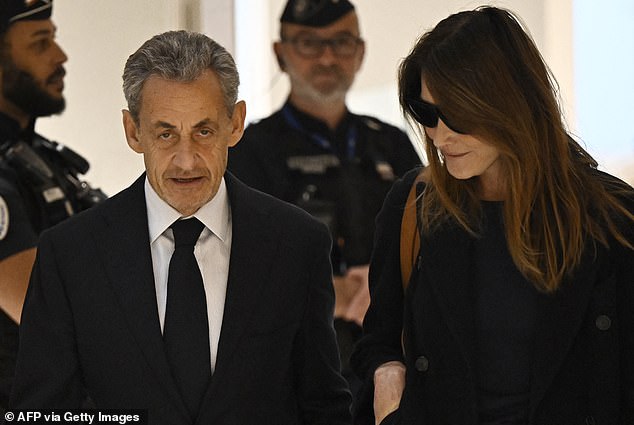Emmanuel Macron is facing mounting calls to pardon the former French president Nicolas Sarkozy after he was sensationally found guilty of criminal conspiracy.
A Paris court on Thursday sentenced Sarkozy, 70, to five years in jail, a €100,000 fine, and a five-year ban from public office over allegations he sought millions from Libyan dictator Muammar Gaddafi to fund his 2007 election campaign.
But the shock ruling has sparked fury on the French right, with allies branding it a ‘tsunami of shame’ and urging Macron to step in.
Should he pardon Sarkozy, he risks accusations of protecting the political elite. But refusing could alienate the conservative right – already hostile to his presidency.
Conservative Les Républicains party senator Stephane Le Rudulier said the president should use his powers to grant clemency, while far-right leader Marine Le Pen warned the punishment set a dangerous precedent.
The historic ruling made Sarkozy the first former president of modern France sentenced to actual time behind bars. After the sentencing, Sarkozy told journalists the ruling was ‘of extreme gravity for the rule of law’ and said he would appeal.
‘I will take responsibility. I will comply with the summons of justice. And if they absolutely want me to sleep in prison, I will sleep in prison. But with my head held high. I am innocent,’ he declared defiantly.
The court issued a deferred detention order effective immediately, meaning Sarkozy must report to prosecutors by October 13 to be informed of when his incarceration will begin.

A Paris court on Thursday sentenced Sarkozy, 70, to five years in jail, a €100,000 fine, and a five-year ban from public office over allegations he sought millions from Libyan dictator Muammar Gaddafi to fund his 2007 election campaign

Should Macron pardon Sarkozy, he risks accusations of protecting the political elite
His imprisonment must start within four months – even if he appeals.
The political fallout was immediate. On the left, critics mocked Sarkozy’s downfall. Green MP Benjamin Lucas quipped: ‘In the end, Sarkozy got his new five-year term,’ in a jibe at the length of the sentence.
But on the right, outrage was fierce. Le Rudulier hit out at the court’s decision, branding it as a disgrace, while Le Pen – herself convicted earlier this year of misusing EU funds – insisted the verdict risked eroding appeal rights across the justice system.
Sarkozy was acquitted of passive corruption, embezzlement of Libyan public funds, and illegal campaign financing, with judges ruling prosecutors had not proved Libyan money actually flowed into his campaign coffers.
Instead, the guilty verdict stemmed from a conspiracy charge that he and his associates worked with Libyan officials between 2005 and 2007 to secure campaign financing.
The chief judge said Sarkozy allowed his close allies to approach Gaddafi’s regime ‘to obtain or try to obtain financial support in Libya for the purpose of securing campaign financing’.
But the court admitted it could not determine whether the money was ultimately used.
The three-month trial also drew in 11 co-defendants, including three former ministers.
One of Sarkozy’s fiercest accusers, businessman Ziad Takieddine, died in Beirut this week at the age of 75 before he could stand trial.
Another fixer, Alexandre Djouhri, and figures linked to Gaddafi’s inner circle were also implicated.
Prosecutors alleged Sarkozy struck a pact with the Libyan regime, promising to improve Gaddafi’s international standing and ease the way for Abdallah Senoussi, the dictator’s brother-in-law, who had been convicted in France over a 1989 bombing that killed 170 people.

The former leader was today found guilty of criminal conspiracy over efforts by close aides to procure funds for his 2007 presidential bid from Libya during the rule of late dictator Muammar Gaddafi (pictured)
But judges dismissed a central piece of evidence – a 2012 Mediapart document allegedly signed by Gadaffi’s former spy chief Moussa Koussa, claiming €6.5million had been sent to Sarkozy’s campaign.
They ruled the document ‘now appears more likely’ to be a forgery.
This is not the only case haunting the former president, however. On October 8, France’s highest court will examine his appeal in the Bygmalion affair, where he was sentenced to a year in prison for overspending on his failed 2012 re-election bid.
He was also convicted in the Bismuth case over corruption and influence peddling, which saw him wear an electronic ankle bracelet earlier this year – an unprecedented punishment for a former French head of state.
That conviction is currently before the European Court of Human Rights.
The dilemma piles fresh pressure on Macron at a time when French politics is deeply polarised, leaving the president caught between outrage on the left and fury on the right.
It comes just a week after almost a million anti-Macron rioters descended on to the streets of Paris in a ‘day of rage’.
The country endured outbursts of carnage and violence, with images from the streets of the capital on September 18 showing major clashes breaking out between cops and rioters.
Masked students carrying banners and placards calling to ‘tax the rich’ waved red flares in front of armoured police as part of nationwide protests against the government’s budget cut plans.
The strikes, another humiliation for Macron, come barely a week after Sébastien Lecornu was appointed prime minister following the toppling of Francois Bayrou’s government.
Unions are calling for more spending on public services, higher taxes on the wealthy and for the budget cuts outlined by the short-lived Bayrou government to be axed.
This article was originally published by a www.dailymail.co.uk . Read the Original article here. .

